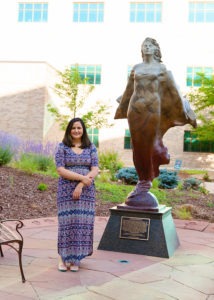What to expect after a breast cancer diagnosis | by

If you or someone you love receives a breast cancer diagnosis, figuring out what to do next can seem overwhelming. Breast specialist, medical oncologist and hematologist Dr. Mabel Mardones at Rocky Mountain Cancer Centers™ offers this professional advice.
Get follow-up tests.
Advanced screenings, such as a diagnostic mammogram, ultrasound or magnetic resonance imaging (MRI) scan, provide more detailed images from multiple vantage points that can help your doctor identify diseased tissue.
Go in for a biopsy.
A biopsy is the only procedure that definitively identifies breast cancer. During the procedure, a radiologist removes tissue, and sometimes fluid, from the suspicious area. These samples are then examined for cancerous cells. The good news is that 80% of women who undergo this diagnostic test don’t have breast cancer. Because this is a highly precise procedure, I recommend going to a breast center that has fellowship-trained radiologists. You’ll get a more accurate diagnosis and have a better experience when you see experts who perform a high volume of these procedures every day.
Talk to a breast surgeon.
Surgery is the most common treatment for breast cancer. A breast surgeon can review your options based on the tumor location, size and type. If you have a family history of breast cancer or a known gene mutation like BRCA that increases cancer risk, your surgeon may recommend a bilateral mastectomy (removal of both breasts) to lower your chances of cancer recurrence. Breast surgeons work collaboratively with plastic surgeons for breast reconstruction.
Meet with a medical oncologist.
A medical oncologist oversees chemotherapy, hormone therapy, immunotherapy and other treatments. Genomic tests can help your doctor customize the most effective treatment plan for your unique tumor biological makeup. Some women benefit from neoadjuvant therapy before surgery. This approach can shrink the cancer allowing you to get a lumpectomy instead of a mastectomy. Your oncologist may also tailor treatments based on how the tumor responds to chemotherapy. Over the last couple of decades, there have been tremendous advancements in medical oncology treatments for breast cancer. We now have anti-hormonal therapies, traditional chemotherapy, targeted therapies like Herceptin®, antibody drug conjugates and immunotherapies. Your oncologist will take many things into consideration before deciding on an appropriate treatment regimen.
Meet with a radiation oncologist.

Dr. Mabel Mardones at Sky Ridge’s Healing Garden in Lone Tree.
Women who have lumpectomies or who have certain cancer types need radiation therapy after surgery to destroy lingering cancer cells. Your radiation oncologist can discuss treatment options, which now include internal radiation. With brachytherapy, your doctor implants tiny radioactive seeds at the tumor site protecting surrounding healthy tissue from radiation exposure.
Consider genetic testing.
Up to 15% of women inherit gene mutations, or changes, that increase breast cancer risk. BRCA1 and BRCA2 are the most well-known, but there are other mutations linked to breast cancer, as well as ovarian cancer, colon cancer, pancreatic cancer and melanoma. Genetic tests use blood samples to identify these mutations. It’s important to work with genetic counselors who can help you understand what the test results mean for your specific cancer risks.
Get a second opinion.
You’re going through an uncertain time that requires making important decisions that affect your long-term health. You should never worry about offending your medical team by seeking a second opinion. Hearing from different experts can help you feel more confident. You won’t be starting any treatment immediately, so you shouldn’t feel rushed to make a rash decision.
Be optimistic.
Women diagnosed with breast cancer today have a lot more reason for hope. There are more effective therapies with fewer side effects. We also have more tools to lower the risk of cancer recurrence. As with any cancer, early detection is key to treatment success.
Learn more about breast specialist, medical oncologist and hematologist Dr. Mabel Mardones at Rocky Mountain Cancer Centers™
Tags: breast cancer survival, Health Profile
Leave a Comment
Please be respectful while leaving comments. All comments are subject to removal by the moderator.

